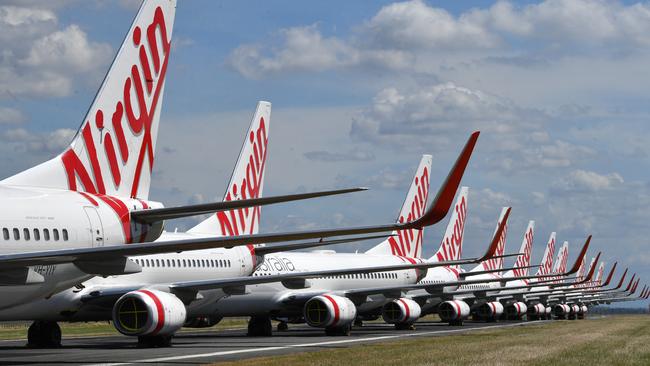Virgin can fly higher if helped to get past crisis: Paul Scurrah
Virgin Australia would emerge ‘stronger than ever’ from the COVID-19 crisis if given financial help, its CEO says.

Virgin Australia would emerge “stronger than ever” from the COVID-19 crisis, if it was given financial assistance to help it get through, according to chief executive Paul Scurrah.
“We now have a reform plan in place to make sure we are going to be stronger than ever on the other side of this crisis,” Mr Scurrah told The Australian.
“It has taken some tough lessons to know how to do it. When we come out of the other side of this crisis, we will be a far leaner, and far stronger business.”
He made his comments in support of the airline’s argument for Virgin to be given a $1.4bn loan to allow it to get through the current crisis.
Mr Scurrah, who took over from former Qantas executive John Borghetti as Virgin chief executive in March last year, said he had been brought into the airline to make it more financially viable.
He said he had already made changes, including announcing the end of Virgin’s flights to Hong Kong, closing its base in New Zealand, taking full control of Virgin’s Velocity frequent-flyer business and accelerating Tigerair’s transition to an all-Boeing 737 fleet.
“We had been making great progress in our reform plan before the current crisis came along,” he said. “The crisis has now given us the opportunity to accelerate some of the cost initiatives.”
He said this included renegotiating contracts with its suppliers, which was now under way.
Mr Scurrah said Virgin’s frequent-flyer business was currently its most valuable asset.
He said the extra debt the company had taken on to buy out its partner in Velocity was “more than covered by the increase in cash dividend as a result of reverting to 100 per cent ownership”.
He said Virgin had taken its first 10 years of operation to get a 30 per cent share of the domestic market.
It was then in a position to transform itself from its original role as a low-cost carrier to being a full-service carrier able to compete for the business traveller market.
“It has been 10 years of huge investment to transform Virgin into that competitor,” he said. “It suffered losses along the way to do that. It has been well supported by shareholders to do that.
“After 20 years we are now, finally, in a position with the plan and reform that has been driven to finally be able to compete with Qantas,” Mr Scurrah added.
He said this showed that it would take a “long, long time” for any new entrant into the market to get to this position.
He said Qantas, which had been operating for more than 100 years, 70 of which involved government ownership, was a “fierce competitor” with “a strong balance sheet” and “formidable financial strength”.
He rejected suggestions that Virgin should not receive financial assistance from the federal government as it had been “badly managed”, referring to comments made by Qantas chief executive Alan Joyce, who said government should not bail out airlines that had been badly managed for 10 years.
“Virgin is an excellent airline,” he said. “We outperform out competitors for reliability, for on-time running, we out perform for customer satisfaction. We significantly outperform on culture.”




To join the conversation, please log in. Don't have an account? Register
Join the conversation, you are commenting as Logout